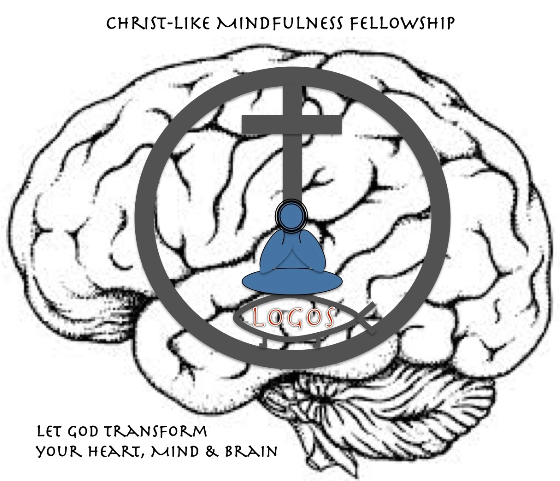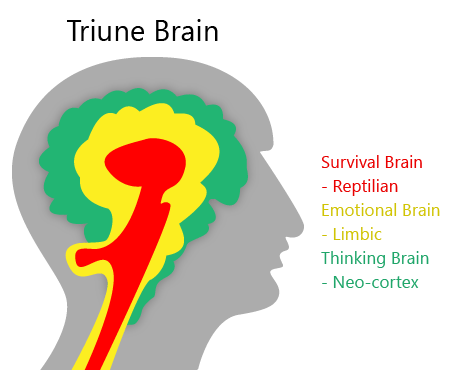
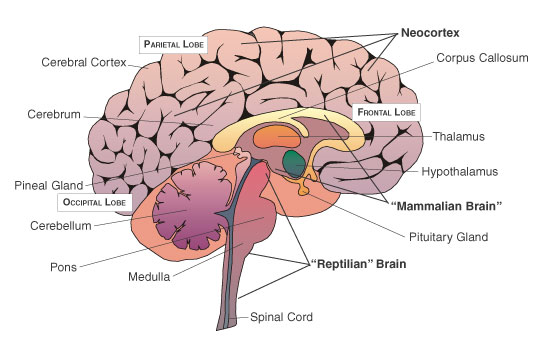
Brain Based Cognitive-Behavioral Christian Transformation
The practice of Christ-like Mindfulness develops in us an intentional awareness of our brain systems and their functions, for the purpose of participating in God’s transformation of our mind, heart and body (flesh) in order to become more Christ-like in experience and behavior. God causes “the Word to be made flesh” for the "renewing of our minds." John 1; Rom: 12-16, Col:4-6; Heb 12-14.
Christian Biopsychosocial Brain Transformation: Up-down Model
Reptilian Brain (subcortical systems): These systems mature structurally in first 3 years of life. We can refer to this part of our brain as the "Toddler Self." It's responsible for wakefulness, sleep, hunger, fear, rage, pain, fight or flight reactions, satiation experience, physical addictions, sexual drive, and the Autonomic Nervous System (ANS) functions-parasympathic and sympathic. Biblical term of “Flesh.”
Mammalian Brain (emotional, visual spatial and attachment systems): These systems mature structurally during the ages 3 months-12 years in life--We can call this part of our brain the enduring "Child Self." It is composed of the Limbic and Right Hemisphere systems that contribute to socio-emotional experience of joy, sadness, anxiety, anger, jealousy, love, curiousity; and it relies on classical, operant, and social learning that give emotional tone and nonverbal meaning to our long-term implicit memories; it contributes to our experience of loving bonds, caring for and teaching descents/young, playfulness, & interpreting non-verbal socially oriented communication. It allows for Us-Them distinctions--both aggressive and loving. Biblical term for these brain systems is "the Heart —the Passions.” (The functions of these brain systems include: avoiding harms, approaching rewards, & attaching to others).
NeocorticalBrain (abstract, verbal, reasoning, executive and narrative systems): These systems mature structurally during ages 10-28 years, which we will call the "Adult Self." Neocortical brain functions include: God consciousness, language mediated planning, delaying gratification, impulse control, & problem solving. It greatly influences the brain's limbic-right brain & ANS systems, but in turn, the heart (limbic-right brain systems) strongly effect/bias intellectual thought & choices. The adult self can become your true Christ-Like Self, but this true Christi-like self will involve the process of Prefrontal Cortex (PFC) right-left brain and limbic/subcortical integration. The Biblical term for these PFC left brain system is “Mind.” In and through biopsychosocial-cultural evolution, God has given us the mental capacity for “the knowledge of good and evil,” and this conceptual/explicit ability is a means of spiritual and psychological transformation. The functions of these brain systems include: inhibition of emotional reactions; mental simulation/planning; internal and external focused attention--consciousness, intentional thoughts and behaviors; intentional integrative verbal narratives of self in time and space (autobiographical episodic memory); and our "default-mode" experience of—”I in time and space” with steam of conscious involving internal and external sensory awareness, and/or memories with verbal narrative with associated images.
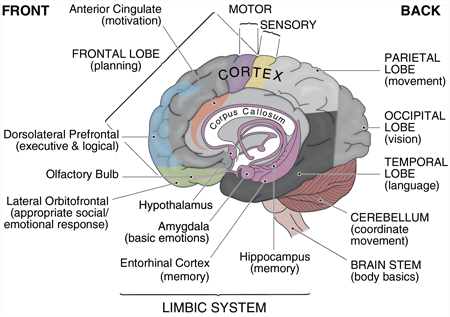
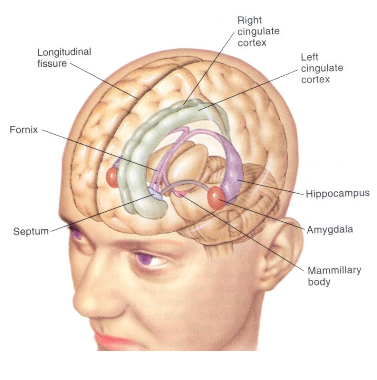
Christ-like Sanctification of our Limbic-Right Brain Systems
The limbic and right neocortical system is instinctually reactive and employs implicitly learned memories rapidly to interpret internal and external awareness (< one sec.). Our limbic right cortical reactions occur mostly outside of our conscious awareness. This system processes dangers, high reward targets, and complex social relationships—”Us-Them” schema—memories. It is governed by classical, social and operant learning, and biological drives. It functions subconsciously and is biased by who or what we emotionally love, fear, crave or hate the most. In small groups of 3-4 we can explore our subconscious (right hemisphere-limbic) biases by examining our thoughts, emotions, desires, physical states, and behaviors. Christ-Like Mindfulness intentionally and prayerful examines our limbic and right brain neocortical processes, and practices formal and informal disciplines that allow us to mature in Christ. God created us with the capacity for neuroplasticity--the brain's ability to recreate (or re-program) itself within a loving Divine relationship.
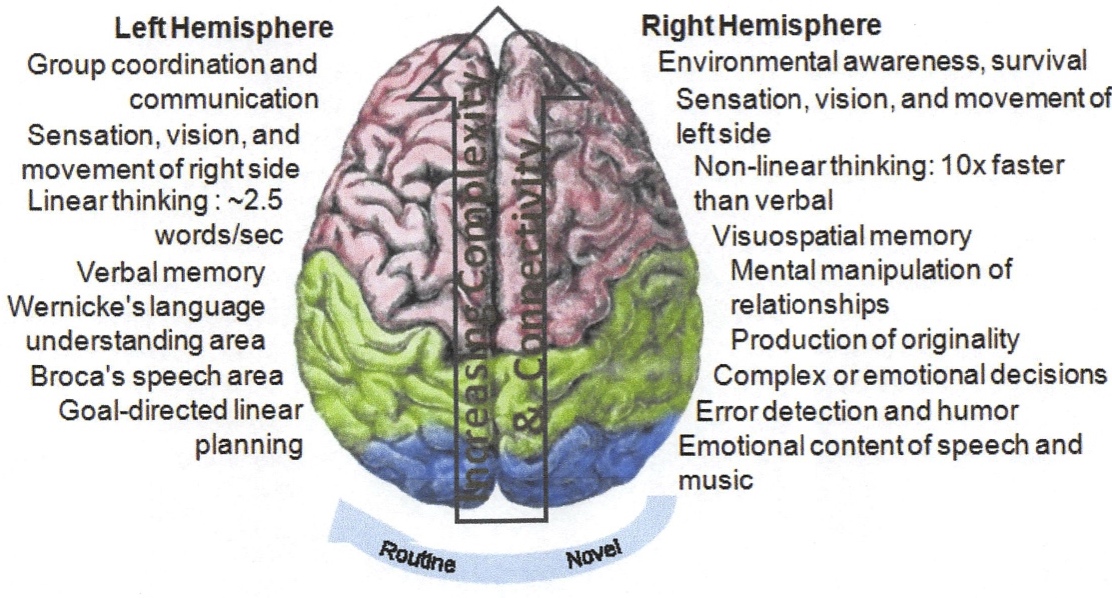
Our limbic-right hemisphere brain systems develop faster in early life (first six years) than our verbal and linear thinking left hemisphere and prefrontal brain systems. In fact our most recently evolved brain area the prefrontal cortex (PFC) does not fully mature until our late 20s. Intentional practice of Christ-like mindfulness and other Christian disciplines promotes PFC development and left-right hemisphere integration, which is associated with benefits listed below.
When we practice Christ-Like Mindfulness...
We develop an ability to identify and change our dysfunctional/sinful behaviors—thus renewing our mind-hearts-bodies by rewiring our brains via neuroplasticity. Rom 12:1-2; Col 3:5-17; Heb 12.
We learn to observe & habitually detach from inappropriate desires, pleasures, greed, and narratives of fear, anger, & distain (our only Christian enemies) Matt 5-7
We experience Christian Maturity: via spiritual and neurocognitive processes of purification, illumination, & unification with God.
We experience less physical suffering when physically ill or injured.
We experience less emotional suffering when emotionally hurt.
We experience increased physical fulfillment in life.
We experience increased emotional fulfillment in life. (the last four statesment of empirical observations see Newberg & Waldman below-- How God Changes our Brains)
We experience the Way of Christ Jesus moment to moment. (Doing no harm, Doing Good, & Staying in love with God) Matt 22:37-40
We experience being loved and known by God. Mk 1:8
“that you may have life and have it abundantly…that my joy may be in you.”
1) Spiritual practices, even when stripped of religious beliefs, enhance the neural functioning of the brain in ways that improve physical and emotional health. The brain is constantly changing, and two weeks of practicing a new behaviors (mindfulness/meditation) makes stable neurological cell changes, in 8 weeks habits. We are what we practice cognitively and behaviorally.
2) Prolonged practice (years) of contemplation on God and other spiritual values appears to permanently change the structure of brain circuits that control our moods and our experiential efficacy of our notions of God and self. Prolonged practice of comtemplation improves selective attention, goal attainment, and our sensory perceptions of God in all things.
3) Contemplative practices strengthen a specific neurological circuit--the PFC-Anterior Cingulate Cortex (ACC) that generates peacefulness, emotional control, social awareness, improved empathy, while slowing aging, and increasing compassionate action toward others.
4) Faith is the most important intentional component for enhancing brain health (both medical & emotional). Faith is def. as realistic, functional and imaginative optimism. The process promotes PFC-ACC and limbic right hemisphere balance in our brains. Faith can add a year to our life during a terminal illness. It improves mental and physical performance, goal attainment, and it enhances the efficacy of all medical procedures. Faith in one’s (or God’s) efficacy is also strongly associated with mental and physical hardiness (ability to cope with stress).
5) Peoples’ stated beliefs predict nothing about healthy brains, but loving religious practices (application of specific beliefs) are associated with emotional, social and physical health—and the Christian Fruits of the Spirit.
6) Authoritarianism that involves angry/fearful/aggressive religious experiences and practices actually harms compassionate areas of our brains; it ages our bodies; and it increases the chances of illness and dysfunctional behaviors. The "enemy is not authoritative religion; the enemy is anger, hostility, intolerance, separatism, extreme idealism, and prejudicial fear—be it secular, religious, or political.”
7) Spiritual practices that involve relaxation and controlled breathing enhance parasympathetic tone, which lowers the emotional and medical damage caused by stress. Being Christ-like inhibits the "Stress Response."
9) Intense, long-term contemplation of God and other spiritual values appears to permanently change the structure and strength of PFC- ACC systems, which are associated with the development of the Fruits of the Spirit. Long term meditation also increase right parietal, and right temporal brain systems, which give rise to our loving experience with God, self and others; Christ-like Meditation increases compassionate acts, and lessens emotional distress. To explore how your brain expresses the Fruits of the Spirit download the provided PDF Brain Based Fruits of the Spirit.
11) Mindfulness Practice: Involves the PFC and ACC, and improves spiritual compassionate detachment (non-reactive awareness, which lowers fear, anger and dysfunctional desires/cravings.)
HOW GOD CHANGES OUR BRAINS adapted from ANDREW NEWBERG, M.D. and MARK ROBERT WALDMAN
Jesus' prayer for you
PDF Brain Based Fruits of the Spirit
